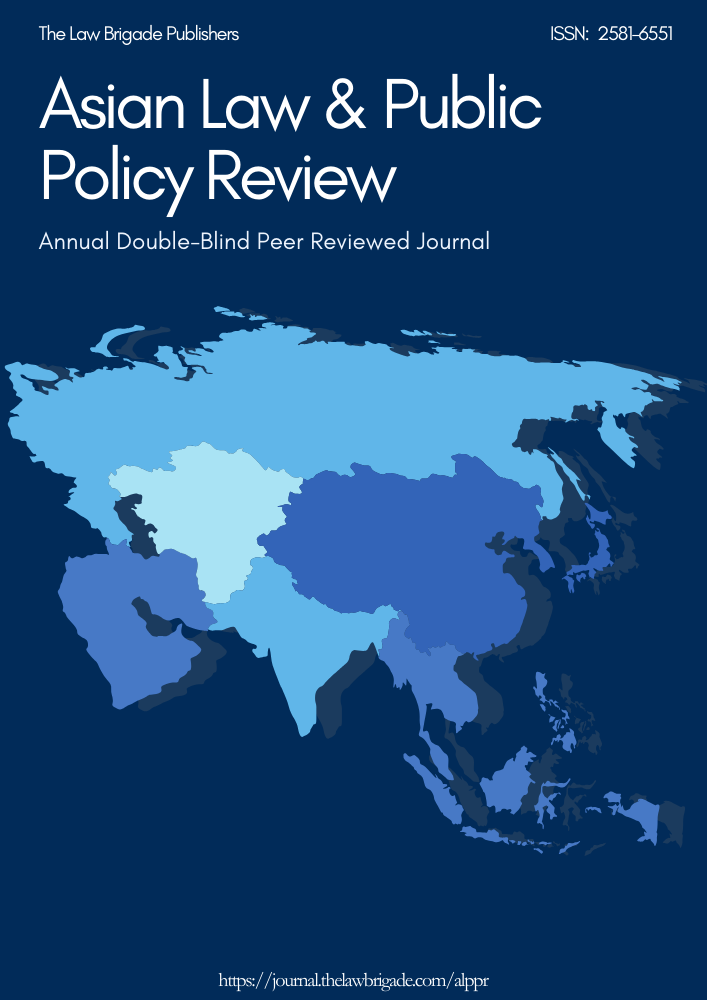INDIA’S CONTRACT FARMING LAWS 2020 FROM ECONOMIC JUSTICE PERSPECTIVE: A BRIEF ANALYSIS
Keywords:
Farm laws, Economic Justice, John Rawls, contract farmingAbstract
India’s central legislature recently, enacted three laws, popularly known as ‘Agro-reform Laws, 2020’ or ‘Farm Laws, 2020’. I will be called it as Argo-Reform legal Trilogy. This Trilogy is enacted with intention to promote agricultural growth globally and to benefit the farmers, by promoting and facilitating agricultural produce through inter-alia, infusion of capital from private sector. My focal point for analysis was whether an invitation to capitalist economy will bring economic justice to the farmers’ community or class? My interest was to uncover the conceptional aspect behind this codification. As per my understanding, this legal trilogy consists of all the factors aiming for global growth and development of India’s farm sector by promoting and inviting the private sector investment into farming sector. Contract farming is not new to the India’s soil. Many Indian farmers have been into it much prior to the enactment of the aforesaid statutes however, this is for the first time, the contract-farming has been so legislatively dressed-up. Therefore, I wanted to explore on the idea that whether the ‘contract farming laws’ could actually be the road to justice for those seekers of economic justice? And if yes, then, to what extent? The main purpose of this paper is to understand and to analyse the intersectional relation between the laws of contract farming, 2020 and the economic justice rooted in the constitution. The paper shall draw on observations based on doctrinal research with the help of primary and secondary data inter-alia, international conventions, academicals theories, policies, statutory materials and court decisions. This research shall contribute in understanding the effectiveness and limitations in implementing the agro statutes with economic justice standpoint made so far.
Downloads
References
Beauchamp, T. L., 1982. The Ethical foundations of Economic Jusrtice: Retrospect and
prospect. Review of Social Economy, 40(3), pp. 291-300.
CS, D., 2005. Contracting farming as a means of value-added Agriculture.
Group, I. T., 2020. Seven Reasons why India's agriculture sector a fresh churn. new delhi:
Inida today group.
Hahnel, R., 2003. Economic Justice. department of economics, American university,
washington, DC.
Justice, I. C. o. E., 2017. time for change, a new vision for the british economy, London:
IPPR, 14 Buckingham Street, London.
Justice, I. C. o. E., 2018. Prosperity and justice: A plan for the new Economy, London: IPPR.
Kapstein, E. B., 2004. Models of International Economic justice. Ethics & International
Affairs, ProQuest Central, Volume 18, p. 79.
Kolm, S.-C., 1995. Economic justice: the central question. european economic review,
Volume 39, pp. 661-673.
Mckee, A., 1979. From a theory of economic justice to its implementation. review of social
economy, 37(1), pp. 63-78.
Nozick, R., 1974. Anarchy, State and Utopia. reprinted 1999 ed. s.l.:Blackwell Publishers
Ltd. 108, Cowley Road, Oxford, OX4 1JF, UK.
Phelps, E., 2009. Economic justice and the spirit of innovation.
Rawls, J., 1999. Theory of Justice. revised edition ed. Cambridge, Massachusetts: Harvard
University press.
Rawls, J., April 1958. justice as fairness. the philpsp[hical review, 67(2), pp. 164-194.
Rehber, P. D. E., 2007. A global overview of contract farming. ICFAI University Press, pp.
3-38.
Robbins, L., n.d. The Concise Encyclopedia of Economics. s.l.:s.n.
Singh, S., 2003. Contract farming in India: Impacts on women and child workers. Delhi: The
Gatekeeper Series.
Singh, S., 2004. Crisis and diversification in Punjab agriculture: Role of State and
agribusiness. Economic and Political weekly, Volume 39, pp. 5583-5590.
Sukhpal, S., 2010. Understanding practice of contract farminf in India: A small producer
Prespective. National Centre for Agricultural Economics and Policy research, New Delhi.
Downloads
Published
Issue
Section
License

This work is licensed under a Creative Commons Attribution-NonCommercial-ShareAlike 4.0 International License.
License Terms
Ownership and Licensing:
Authors of research papers submitted to any journal published by The Law Brigade Publishers retain the copyright of their work while granting the journal specific rights. Authors maintain ownership of the copyright and grant the journal the right of first publication. Simultaneously, authors agree to license their research papers under the Creative Commons Attribution-ShareAlike 4.0 International (CC BY-SA 4.0) License.
License Permissions:
Under the CC BY-SA 4.0 License, others are permitted to share and adapt the work, even for commercial purposes, provided that appropriate attribution is given to the authors, and acknowledgment is made of the initial publication by The Law Brigade Publishers. This license encourages the broad dissemination and reuse of research papers while ensuring that the original work is properly credited.
Additional Distribution Arrangements:
Authors are free to enter into separate, non-exclusive contractual arrangements for distributing the published version of the work (e.g., posting it to institutional repositories or publishing it in books), provided that the original publication by The Law Brigade Publishers is acknowledged.
Online Posting:
Authors are encouraged to share their work online (e.g., in institutional repositories or on personal websites) both prior to submission and after publication. This practice can facilitate productive exchanges and increase the visibility and citation of the work.
Responsibility and Liability:
Authors are responsible for ensuring that their submitted research papers do not infringe on the copyright, privacy, or other rights of third parties. The Law Brigade Publishers disclaims any liability for any copyright infringement or violation of third-party rights within the submitted research papers.


